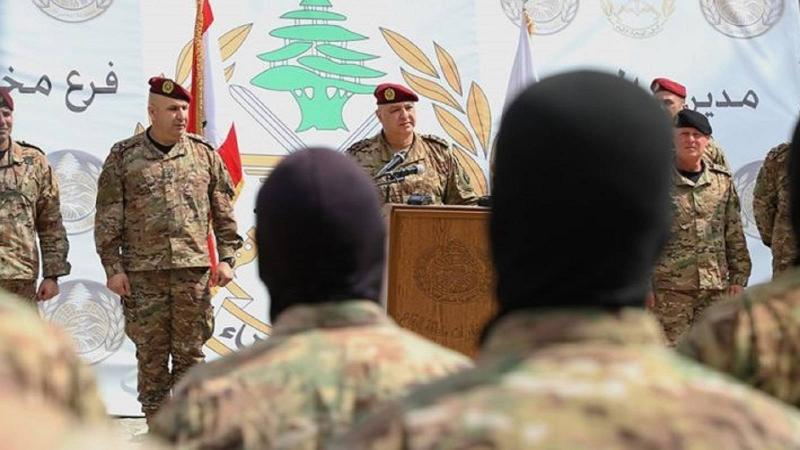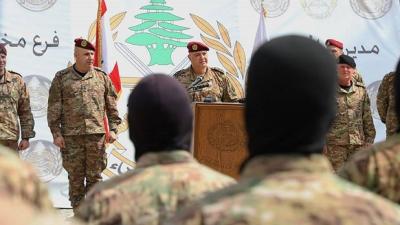It is well-known within the Lebanese state apparatus that there are many declared cooks, but only one actual chef. Every day, until recently, there has been a parable regarding this rule. The latest, and certainly not the last, concerns the handling of the extension of the commander of the army's term, which was to be addressed in a Cabinet session last Tuesday but was derailed in the few hours leading up to it on Monday night. The understood and agreed-upon expectation was that the council would reach a decision to extend the term of Army Commander General Joseph Aoun for a year. It was also assumed that the required legal quorum for convening and making such a decision was guaranteed. However, on Monday night, the caretaker Prime Minister Najib Mikati was informed by Hezbollah of a different stance: they wished to refrain from discussing the extension of the army commander’s term and proposed postponing it to a later date for further consultations. This new position from the party was coupled with a warning that raising the topic would lead to its two ministers leaving the session, effectively nullifying its quorum. The failure to convene the Tuesday session meant that its agenda could not be discussed, resulting in a decision to return to it the following week. On Wednesday evening, ministers were suddenly informed of a session scheduled for Thursday, suggesting a return to addressing the commander’s extension. However, nothing of the sort transpired. Since Tuesday, the debate has revolved around the same issue: the extension of Aoun or appointing a new army commander? The extension avenue was being pursued smoothly despite the political divisions surrounding it and the legal complications entailed in executing it:
1. Despite the positive impressions that Parliament Speaker Nabih Berri conveyed following his meeting with Lebanese Forces deputies, confirming that he would call a full parliamentary session at the beginning of the month to approve raising the retirement age of the army commander by one year if it could not be resolved in the Cabinet, Berri's more frequently repeated position is twofold: first, that there should be no exception to the rule established since last March with General Abbas Ibrahim, and second, that the Parliament is not the appropriate venue for extending the term.
2. The actual obstacle concerning how the Cabinet can manage to extend the term revolves around its constitutional formulation, as the procedures for delaying retirement are outlined in the Defense Law, and the Minister's signature on a decree to postpone the retirement is mandatory to avoid nullifying it. Both avenues are impossible: either a decision issued by the minister with the authority to delay the decree, or his mandatory signature on a decree to postpone the retirement that the Cabinet wishes to issue without having such authority. The Cabinet fundamentally cannot do either nor encroach upon a power granted by the Constitution to the minister in Article 66, and the Defense Law in Article 55, which outlines the mechanism for it.
3. Until Monday evening, Hezbollah was heard saying that the fate of the army's leadership would be decided between two options: either extending the term of the current commander, or appointing a new Chief of Staff to immediately lead the army to avoid a vacancy. The proposal to appoint a new Chief of Staff without first extending Aoun's term or appointing a new army commander raised dual opposition: that of former Progressive Socialist Party leader Walid Jumblatt against appointing a Chief of Staff without first extending Aoun's term or appointing a new commander, and Orthodox opposition to excluding the appointment of a representative of their sect in the military council.
4. The last supposed winning card to hinder the extension of the army commander is former President Michel Aoun. In a speech delivered last Sunday by Free Patriotic Movement leader Gebran Bassil, the high tone with which he addressed the extension reflected a certainty of its occurrence before various significant reasons rolled in to slow down the decision-making process and subsequently postpone it, paving the way to divert attention from it. Indeed, extending the term of the army commander would lead to a definitive separation between Bassil and Hezbollah. Both have exerted efforts in recent months, despite their shaky trust, to prevent drifting apart during a phase in which both parties need each other.
It is not hidden that the former president was the only one among the three preceding presidents who appointed the army commander himself without it being imposed on him. It is also clear that when the president proposed the name of the current commander, Bassil rejected it and Hezbollah was not enthusiastic. Eventually, Aoun informed the party that he personally guaranteed him. At that time, the former president expressed to his visitors his confidence in the person succeeding him in the army leadership and emphasized that he was "one of the chicks I raised," referring to his nurturing of General Aoun as he rose through the ranks and remained close to him, akin to the former president's habit of relying on junior officers when he was commander of the army himself. Their relationship collapsed following the events of October 17, 2019. The General was summoned to Baabda Palace three times and was asked to open roads that had been blocked by popular protests but did not respond to any of them. The army commander's behavior left the president feeling betrayed and disappointed. Since then, President Aoun has lost faith in Commander Aoun during a time of conflict between the army commander and Bassil. Each of them has a wealth of reasons to recount against the other. The former president's involvement in the plan to extend the current commander’s term likely accelerated the opening of closed options by last Monday.
5. What awaits Mikati's government, unless something new arises as is constantly the case in a country open to surprises at any moment, is a decisive resolution of the option in the coming days. Political corridors suggest that the likely exit to emerge is either appointing a new army commander or entrusting the army's leadership to a Maronite proxy until a president of the republic is elected. If the first option is chosen in the coming days, before Aoun's scheduled retirement on January 10, it would either place him at the disposal of the Defense Minister, or assign him to a diplomatic role outside the military establishment (an authority that inherently necessitates a president of the republic who holds it, which is closer to being impossible in the absence of a foreign minister in the Cabinet). Both scenarios are unlikely if leadership is assigned to either an authentic or proxy commander on January 10.
Previously, before the Lebanese Civil War, the Cabinet made two decisions to appoint an army commander in the diplomatic service without actually appointing anyone: the first in January 1970 when General Emil Bustani was dismissed, and the second in September 1975 when General Iskandar Ghanem was dismissed.




